Analysis of Equitable and Statutory Remedies for Minority Oppression
VerifiedAdded on 2022/12/20
|10
|2864
|1
Report
AI Summary
This report provides legal advice to Tim regarding the remedies available to him as a minority shareholder facing potential oppression from his brothers who hold the majority stake in their company. It begins by outlining the concept of minority shareholder protection and referencing the foundational case of Foss v. Harbottle, which established the internal management and proper plaintiff rules. The report then details the common law and statutory exceptions to these rules, including instances of illegal or ultra vires acts, special majority requirements, violations of personal rights, and fraud. The core of the report focuses on section 232 of the Corporations Act, which provides remedies for minority oppression. It explains who can bring an oppression claim, what constitutes oppressive conduct (such as exclusion from company affairs or denial of information), and the remedies available under section 233, including orders to wind up the company, modify the constitution, or compel the purchase of shares. The report highlights that the courts consider the welfare of both majority and minority shareholders when deciding whether conduct is oppressive, and it emphasizes that the most common remedy sought is the purchase of the oppressed member's shares.
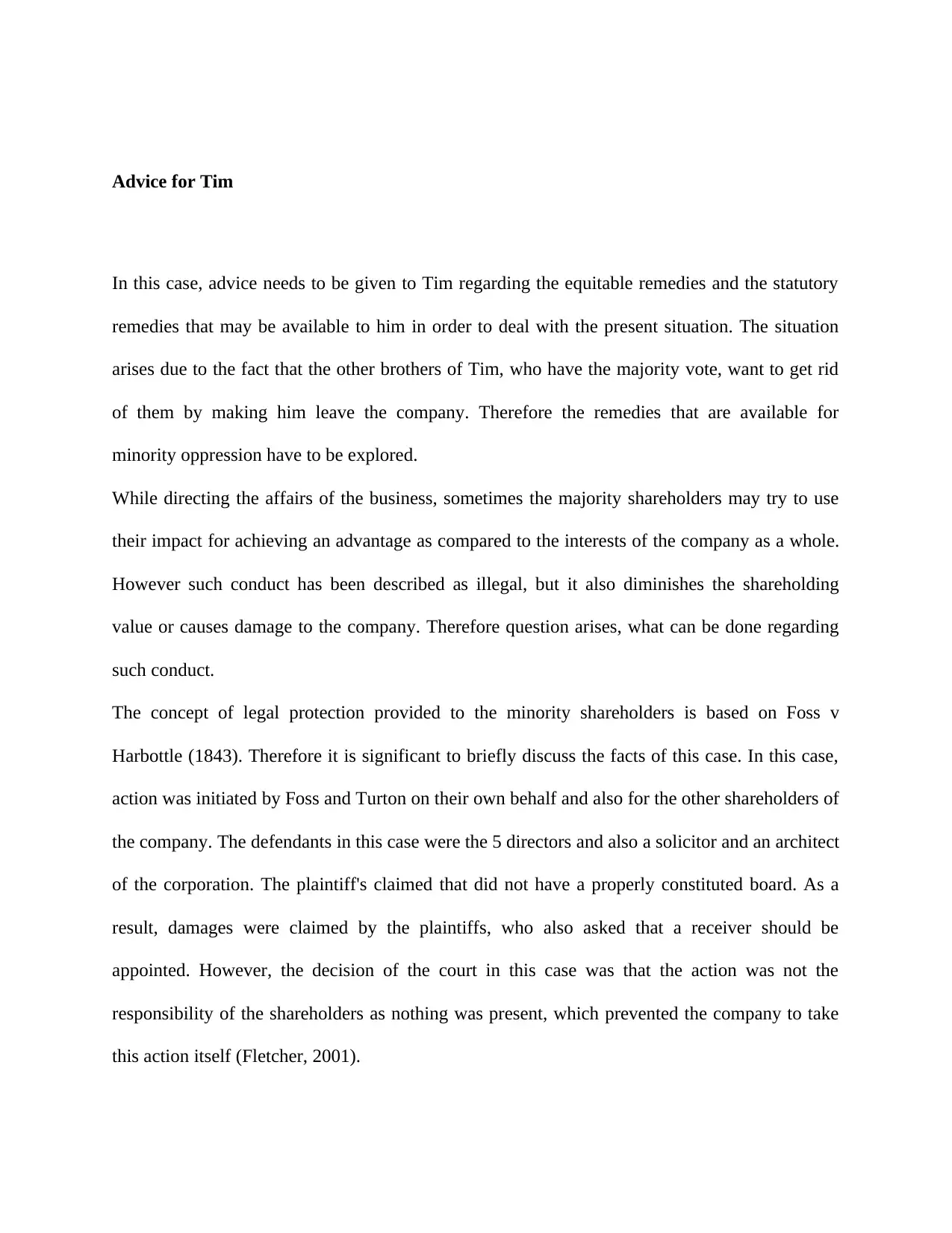
Advice for Tim
In this case, advice needs to be given to Tim regarding the equitable remedies and the statutory
remedies that may be available to him in order to deal with the present situation. The situation
arises due to the fact that the other brothers of Tim, who have the majority vote, want to get rid
of them by making him leave the company. Therefore the remedies that are available for
minority oppression have to be explored.
While directing the affairs of the business, sometimes the majority shareholders may try to use
their impact for achieving an advantage as compared to the interests of the company as a whole.
However such conduct has been described as illegal, but it also diminishes the shareholding
value or causes damage to the company. Therefore question arises, what can be done regarding
such conduct.
The concept of legal protection provided to the minority shareholders is based on Foss v
Harbottle (1843). Therefore it is significant to briefly discuss the facts of this case. In this case,
action was initiated by Foss and Turton on their own behalf and also for the other shareholders of
the company. The defendants in this case were the 5 directors and also a solicitor and an architect
of the corporation. The plaintiff's claimed that did not have a properly constituted board. As a
result, damages were claimed by the plaintiffs, who also asked that a receiver should be
appointed. However, the decision of the court in this case was that the action was not the
responsibility of the shareholders as nothing was present, which prevented the company to take
this action itself (Fletcher, 2001).
In this case, advice needs to be given to Tim regarding the equitable remedies and the statutory
remedies that may be available to him in order to deal with the present situation. The situation
arises due to the fact that the other brothers of Tim, who have the majority vote, want to get rid
of them by making him leave the company. Therefore the remedies that are available for
minority oppression have to be explored.
While directing the affairs of the business, sometimes the majority shareholders may try to use
their impact for achieving an advantage as compared to the interests of the company as a whole.
However such conduct has been described as illegal, but it also diminishes the shareholding
value or causes damage to the company. Therefore question arises, what can be done regarding
such conduct.
The concept of legal protection provided to the minority shareholders is based on Foss v
Harbottle (1843). Therefore it is significant to briefly discuss the facts of this case. In this case,
action was initiated by Foss and Turton on their own behalf and also for the other shareholders of
the company. The defendants in this case were the 5 directors and also a solicitor and an architect
of the corporation. The plaintiff's claimed that did not have a properly constituted board. As a
result, damages were claimed by the plaintiffs, who also asked that a receiver should be
appointed. However, the decision of the court in this case was that the action was not the
responsibility of the shareholders as nothing was present, which prevented the company to take
this action itself (Fletcher, 2001).
Paraphrase This Document
Need a fresh take? Get an instant paraphrase of this document with our AI Paraphraser
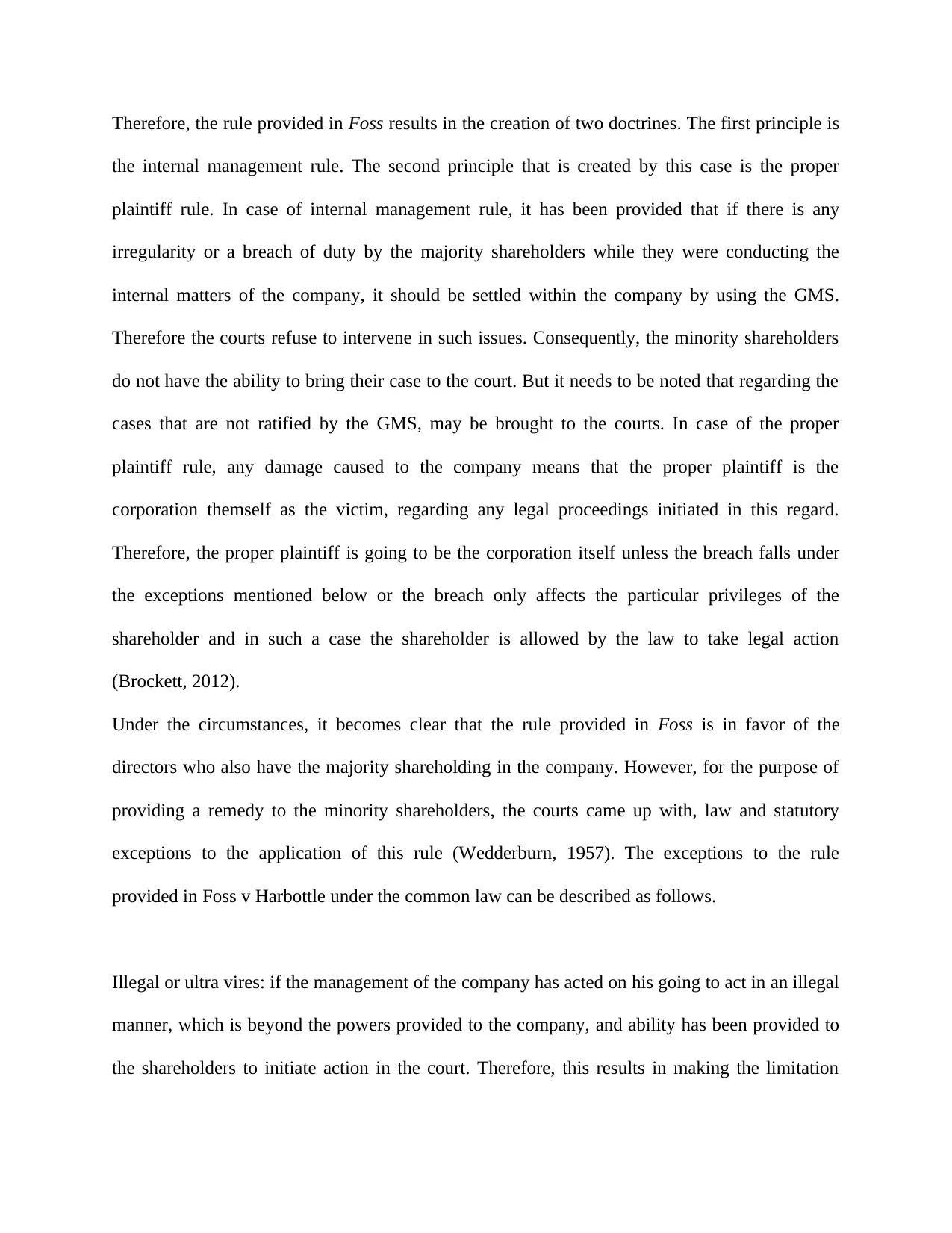
Therefore, the rule provided in Foss results in the creation of two doctrines. The first principle is
the internal management rule. The second principle that is created by this case is the proper
plaintiff rule. In case of internal management rule, it has been provided that if there is any
irregularity or a breach of duty by the majority shareholders while they were conducting the
internal matters of the company, it should be settled within the company by using the GMS.
Therefore the courts refuse to intervene in such issues. Consequently, the minority shareholders
do not have the ability to bring their case to the court. But it needs to be noted that regarding the
cases that are not ratified by the GMS, may be brought to the courts. In case of the proper
plaintiff rule, any damage caused to the company means that the proper plaintiff is the
corporation themself as the victim, regarding any legal proceedings initiated in this regard.
Therefore, the proper plaintiff is going to be the corporation itself unless the breach falls under
the exceptions mentioned below or the breach only affects the particular privileges of the
shareholder and in such a case the shareholder is allowed by the law to take legal action
(Brockett, 2012).
Under the circumstances, it becomes clear that the rule provided in Foss is in favor of the
directors who also have the majority shareholding in the company. However, for the purpose of
providing a remedy to the minority shareholders, the courts came up with, law and statutory
exceptions to the application of this rule (Wedderburn, 1957). The exceptions to the rule
provided in Foss v Harbottle under the common law can be described as follows.
Illegal or ultra vires: if the management of the company has acted on his going to act in an illegal
manner, which is beyond the powers provided to the company, and ability has been provided to
the shareholders to initiate action in the court. Therefore, this results in making the limitation
the internal management rule. The second principle that is created by this case is the proper
plaintiff rule. In case of internal management rule, it has been provided that if there is any
irregularity or a breach of duty by the majority shareholders while they were conducting the
internal matters of the company, it should be settled within the company by using the GMS.
Therefore the courts refuse to intervene in such issues. Consequently, the minority shareholders
do not have the ability to bring their case to the court. But it needs to be noted that regarding the
cases that are not ratified by the GMS, may be brought to the courts. In case of the proper
plaintiff rule, any damage caused to the company means that the proper plaintiff is the
corporation themself as the victim, regarding any legal proceedings initiated in this regard.
Therefore, the proper plaintiff is going to be the corporation itself unless the breach falls under
the exceptions mentioned below or the breach only affects the particular privileges of the
shareholder and in such a case the shareholder is allowed by the law to take legal action
(Brockett, 2012).
Under the circumstances, it becomes clear that the rule provided in Foss is in favor of the
directors who also have the majority shareholding in the company. However, for the purpose of
providing a remedy to the minority shareholders, the courts came up with, law and statutory
exceptions to the application of this rule (Wedderburn, 1957). The exceptions to the rule
provided in Foss v Harbottle under the common law can be described as follows.
Illegal or ultra vires: if the management of the company has acted on his going to act in an illegal
manner, which is beyond the powers provided to the company, and ability has been provided to
the shareholders to initiate action in the court. Therefore, this results in making the limitation
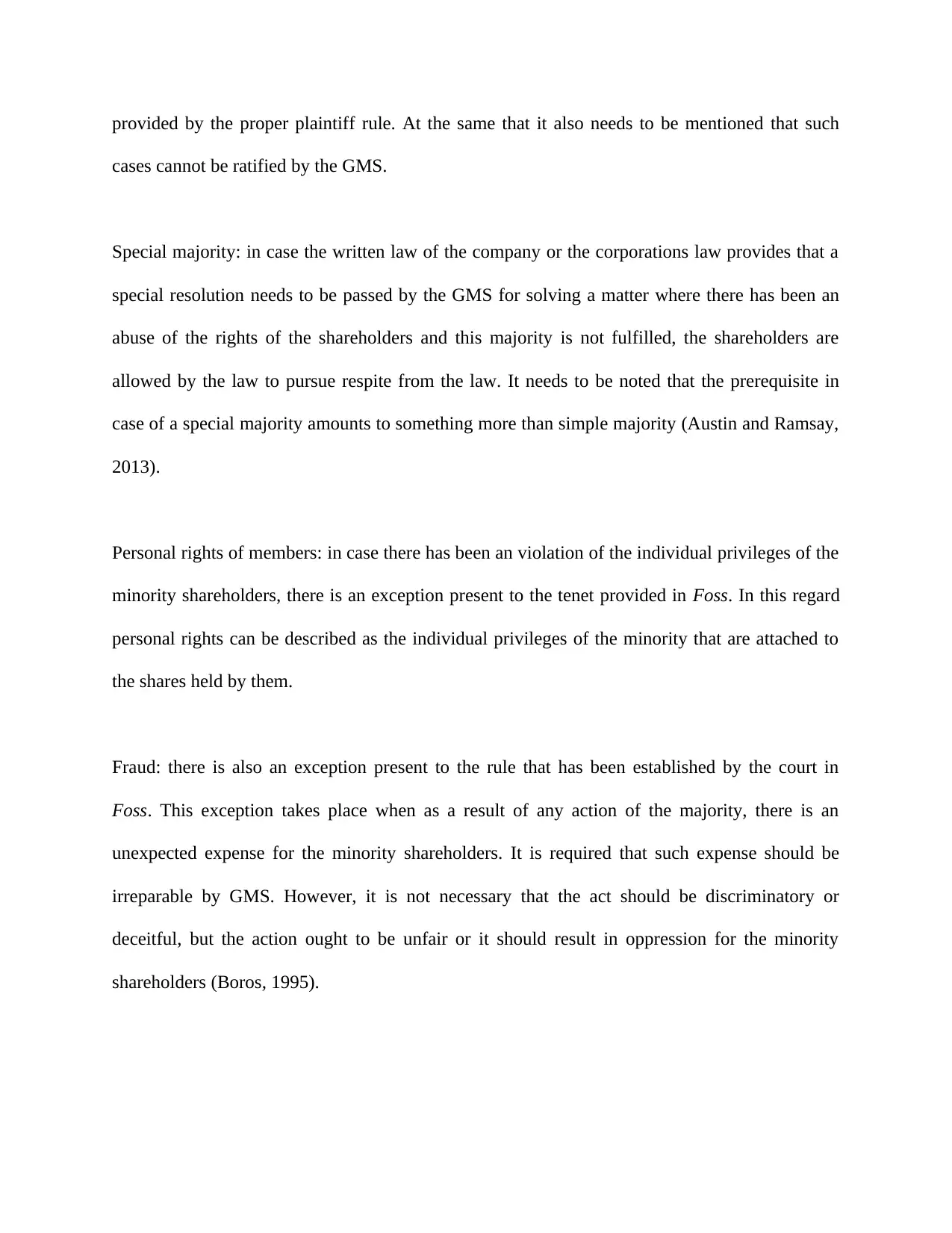
provided by the proper plaintiff rule. At the same that it also needs to be mentioned that such
cases cannot be ratified by the GMS.
Special majority: in case the written law of the company or the corporations law provides that a
special resolution needs to be passed by the GMS for solving a matter where there has been an
abuse of the rights of the shareholders and this majority is not fulfilled, the shareholders are
allowed by the law to pursue respite from the law. It needs to be noted that the prerequisite in
case of a special majority amounts to something more than simple majority (Austin and Ramsay,
2013).
Personal rights of members: in case there has been an violation of the individual privileges of the
minority shareholders, there is an exception present to the tenet provided in Foss. In this regard
personal rights can be described as the individual privileges of the minority that are attached to
the shares held by them.
Fraud: there is also an exception present to the rule that has been established by the court in
Foss. This exception takes place when as a result of any action of the majority, there is an
unexpected expense for the minority shareholders. It is required that such expense should be
irreparable by GMS. However, it is not necessary that the act should be discriminatory or
deceitful, but the action ought to be unfair or it should result in oppression for the minority
shareholders (Boros, 1995).
cases cannot be ratified by the GMS.
Special majority: in case the written law of the company or the corporations law provides that a
special resolution needs to be passed by the GMS for solving a matter where there has been an
abuse of the rights of the shareholders and this majority is not fulfilled, the shareholders are
allowed by the law to pursue respite from the law. It needs to be noted that the prerequisite in
case of a special majority amounts to something more than simple majority (Austin and Ramsay,
2013).
Personal rights of members: in case there has been an violation of the individual privileges of the
minority shareholders, there is an exception present to the tenet provided in Foss. In this regard
personal rights can be described as the individual privileges of the minority that are attached to
the shares held by them.
Fraud: there is also an exception present to the rule that has been established by the court in
Foss. This exception takes place when as a result of any action of the majority, there is an
unexpected expense for the minority shareholders. It is required that such expense should be
irreparable by GMS. However, it is not necessary that the act should be discriminatory or
deceitful, but the action ought to be unfair or it should result in oppression for the minority
shareholders (Boros, 1995).
⊘ This is a preview!⊘
Do you want full access?
Subscribe today to unlock all pages.

Trusted by 1+ million students worldwide
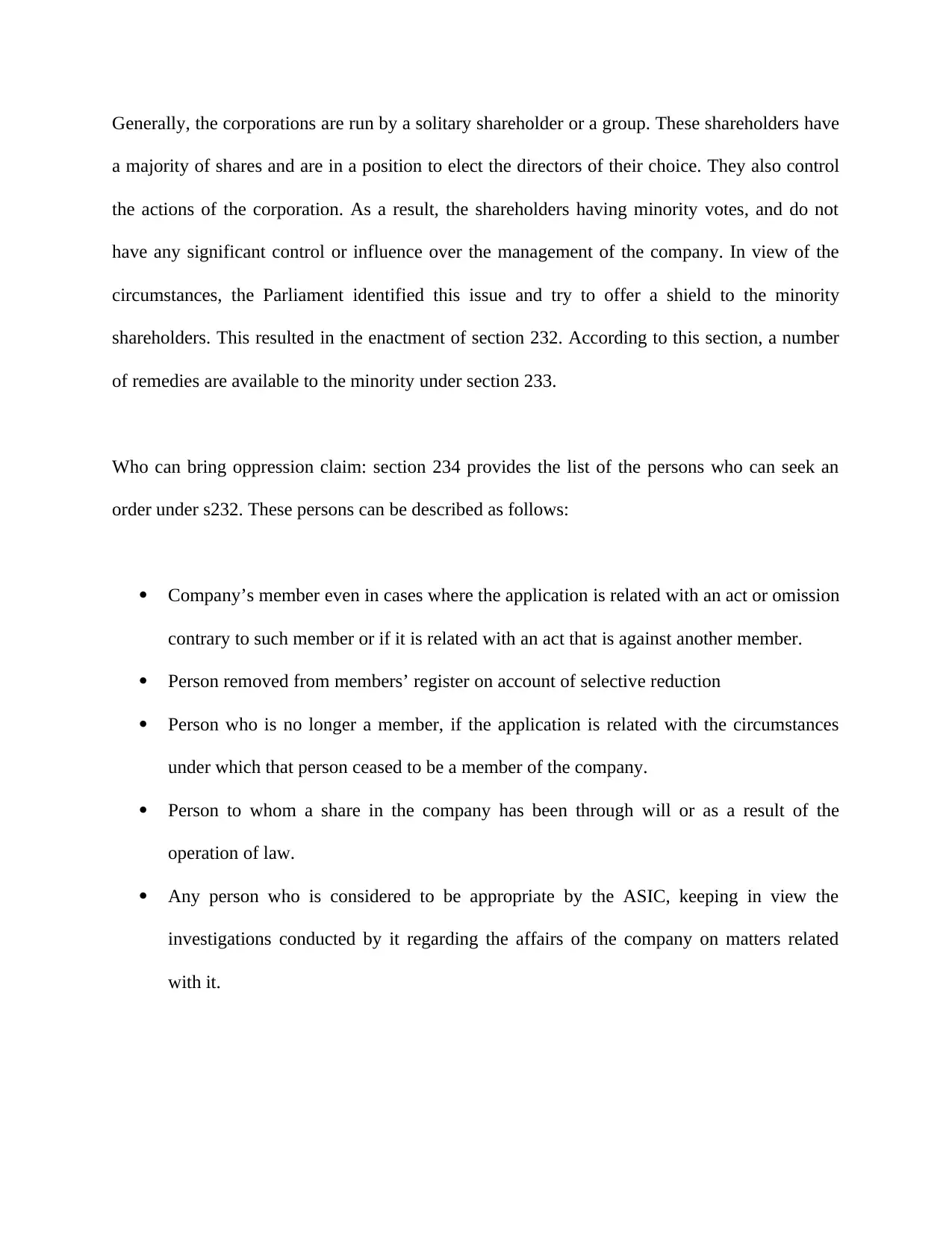
Generally, the corporations are run by a solitary shareholder or a group. These shareholders have
a majority of shares and are in a position to elect the directors of their choice. They also control
the actions of the corporation. As a result, the shareholders having minority votes, and do not
have any significant control or influence over the management of the company. In view of the
circumstances, the Parliament identified this issue and try to offer a shield to the minority
shareholders. This resulted in the enactment of section 232. According to this section, a number
of remedies are available to the minority under section 233.
Who can bring oppression claim: section 234 provides the list of the persons who can seek an
order under s232. These persons can be described as follows:
Company’s member even in cases where the application is related with an act or omission
contrary to such member or if it is related with an act that is against another member.
Person removed from members’ register on account of selective reduction
Person who is no longer a member, if the application is related with the circumstances
under which that person ceased to be a member of the company.
Person to whom a share in the company has been through will or as a result of the
operation of law.
Any person who is considered to be appropriate by the ASIC, keeping in view the
investigations conducted by it regarding the affairs of the company on matters related
with it.
a majority of shares and are in a position to elect the directors of their choice. They also control
the actions of the corporation. As a result, the shareholders having minority votes, and do not
have any significant control or influence over the management of the company. In view of the
circumstances, the Parliament identified this issue and try to offer a shield to the minority
shareholders. This resulted in the enactment of section 232. According to this section, a number
of remedies are available to the minority under section 233.
Who can bring oppression claim: section 234 provides the list of the persons who can seek an
order under s232. These persons can be described as follows:
Company’s member even in cases where the application is related with an act or omission
contrary to such member or if it is related with an act that is against another member.
Person removed from members’ register on account of selective reduction
Person who is no longer a member, if the application is related with the circumstances
under which that person ceased to be a member of the company.
Person to whom a share in the company has been through will or as a result of the
operation of law.
Any person who is considered to be appropriate by the ASIC, keeping in view the
investigations conducted by it regarding the affairs of the company on matters related
with it.
Paraphrase This Document
Need a fresh take? Get an instant paraphrase of this document with our AI Paraphraser
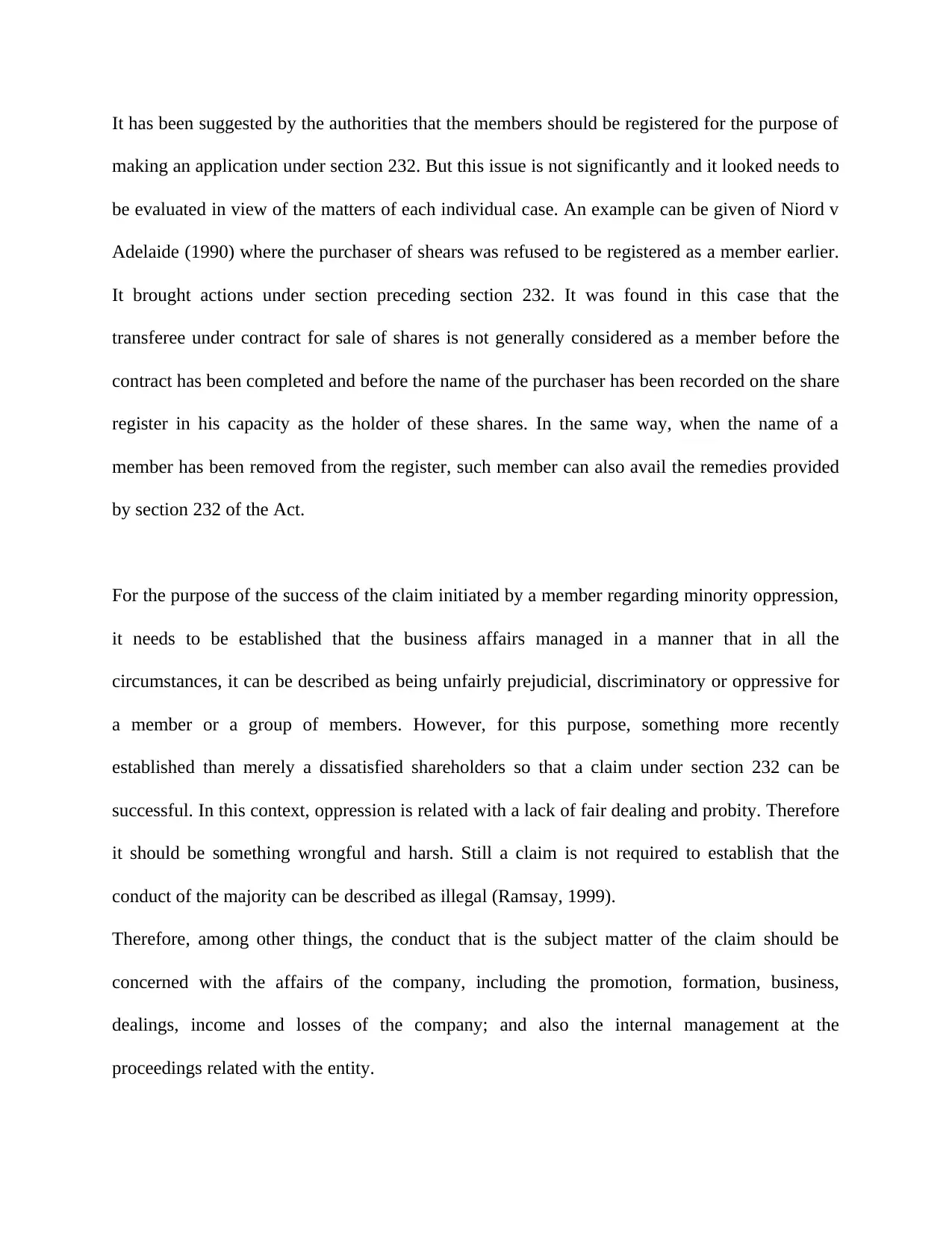
It has been suggested by the authorities that the members should be registered for the purpose of
making an application under section 232. But this issue is not significantly and it looked needs to
be evaluated in view of the matters of each individual case. An example can be given of Niord v
Adelaide (1990) where the purchaser of shears was refused to be registered as a member earlier.
It brought actions under section preceding section 232. It was found in this case that the
transferee under contract for sale of shares is not generally considered as a member before the
contract has been completed and before the name of the purchaser has been recorded on the share
register in his capacity as the holder of these shares. In the same way, when the name of a
member has been removed from the register, such member can also avail the remedies provided
by section 232 of the Act.
For the purpose of the success of the claim initiated by a member regarding minority oppression,
it needs to be established that the business affairs managed in a manner that in all the
circumstances, it can be described as being unfairly prejudicial, discriminatory or oppressive for
a member or a group of members. However, for this purpose, something more recently
established than merely a dissatisfied shareholders so that a claim under section 232 can be
successful. In this context, oppression is related with a lack of fair dealing and probity. Therefore
it should be something wrongful and harsh. Still a claim is not required to establish that the
conduct of the majority can be described as illegal (Ramsay, 1999).
Therefore, among other things, the conduct that is the subject matter of the claim should be
concerned with the affairs of the company, including the promotion, formation, business,
dealings, income and losses of the company; and also the internal management at the
proceedings related with the entity.
making an application under section 232. But this issue is not significantly and it looked needs to
be evaluated in view of the matters of each individual case. An example can be given of Niord v
Adelaide (1990) where the purchaser of shears was refused to be registered as a member earlier.
It brought actions under section preceding section 232. It was found in this case that the
transferee under contract for sale of shares is not generally considered as a member before the
contract has been completed and before the name of the purchaser has been recorded on the share
register in his capacity as the holder of these shares. In the same way, when the name of a
member has been removed from the register, such member can also avail the remedies provided
by section 232 of the Act.
For the purpose of the success of the claim initiated by a member regarding minority oppression,
it needs to be established that the business affairs managed in a manner that in all the
circumstances, it can be described as being unfairly prejudicial, discriminatory or oppressive for
a member or a group of members. However, for this purpose, something more recently
established than merely a dissatisfied shareholders so that a claim under section 232 can be
successful. In this context, oppression is related with a lack of fair dealing and probity. Therefore
it should be something wrongful and harsh. Still a claim is not required to establish that the
conduct of the majority can be described as illegal (Ramsay, 1999).
Therefore, among other things, the conduct that is the subject matter of the claim should be
concerned with the affairs of the company, including the promotion, formation, business,
dealings, income and losses of the company; and also the internal management at the
proceedings related with the entity.
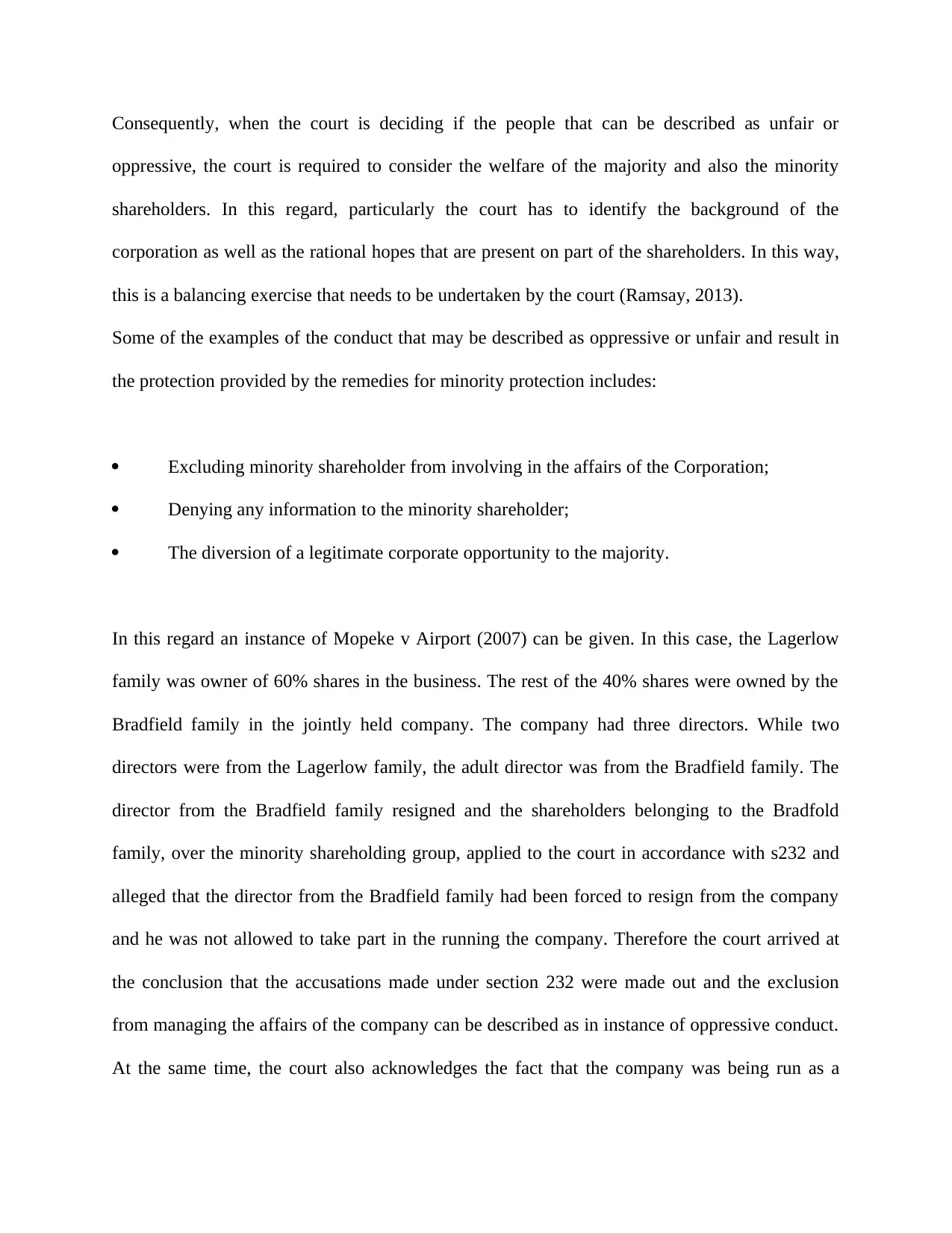
Consequently, when the court is deciding if the people that can be described as unfair or
oppressive, the court is required to consider the welfare of the majority and also the minority
shareholders. In this regard, particularly the court has to identify the background of the
corporation as well as the rational hopes that are present on part of the shareholders. In this way,
this is a balancing exercise that needs to be undertaken by the court (Ramsay, 2013).
Some of the examples of the conduct that may be described as oppressive or unfair and result in
the protection provided by the remedies for minority protection includes:
Excluding minority shareholder from involving in the affairs of the Corporation;
Denying any information to the minority shareholder;
The diversion of a legitimate corporate opportunity to the majority.
In this regard an instance of Mopeke v Airport (2007) can be given. In this case, the Lagerlow
family was owner of 60% shares in the business. The rest of the 40% shares were owned by the
Bradfield family in the jointly held company. The company had three directors. While two
directors were from the Lagerlow family, the adult director was from the Bradfield family. The
director from the Bradfield family resigned and the shareholders belonging to the Bradfold
family, over the minority shareholding group, applied to the court in accordance with s232 and
alleged that the director from the Bradfield family had been forced to resign from the company
and he was not allowed to take part in the running the company. Therefore the court arrived at
the conclusion that the accusations made under section 232 were made out and the exclusion
from managing the affairs of the company can be described as in instance of oppressive conduct.
At the same time, the court also acknowledges the fact that the company was being run as a
oppressive, the court is required to consider the welfare of the majority and also the minority
shareholders. In this regard, particularly the court has to identify the background of the
corporation as well as the rational hopes that are present on part of the shareholders. In this way,
this is a balancing exercise that needs to be undertaken by the court (Ramsay, 2013).
Some of the examples of the conduct that may be described as oppressive or unfair and result in
the protection provided by the remedies for minority protection includes:
Excluding minority shareholder from involving in the affairs of the Corporation;
Denying any information to the minority shareholder;
The diversion of a legitimate corporate opportunity to the majority.
In this regard an instance of Mopeke v Airport (2007) can be given. In this case, the Lagerlow
family was owner of 60% shares in the business. The rest of the 40% shares were owned by the
Bradfield family in the jointly held company. The company had three directors. While two
directors were from the Lagerlow family, the adult director was from the Bradfield family. The
director from the Bradfield family resigned and the shareholders belonging to the Bradfold
family, over the minority shareholding group, applied to the court in accordance with s232 and
alleged that the director from the Bradfield family had been forced to resign from the company
and he was not allowed to take part in the running the company. Therefore the court arrived at
the conclusion that the accusations made under section 232 were made out and the exclusion
from managing the affairs of the company can be described as in instance of oppressive conduct.
At the same time, the court also acknowledges the fact that the company was being run as a
⊘ This is a preview!⊘
Do you want full access?
Subscribe today to unlock all pages.

Trusted by 1+ million students worldwide
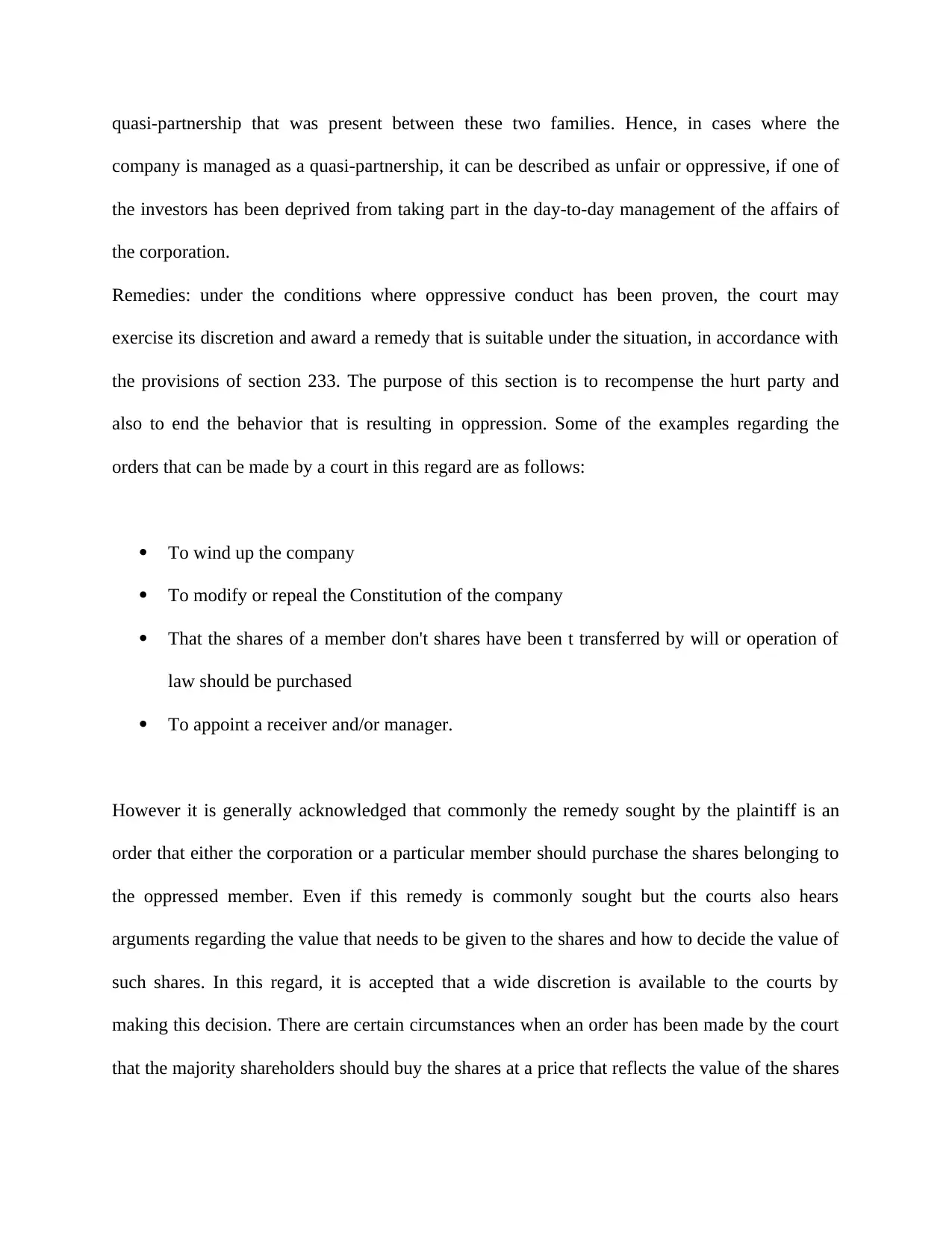
quasi-partnership that was present between these two families. Hence, in cases where the
company is managed as a quasi-partnership, it can be described as unfair or oppressive, if one of
the investors has been deprived from taking part in the day-to-day management of the affairs of
the corporation.
Remedies: under the conditions where oppressive conduct has been proven, the court may
exercise its discretion and award a remedy that is suitable under the situation, in accordance with
the provisions of section 233. The purpose of this section is to recompense the hurt party and
also to end the behavior that is resulting in oppression. Some of the examples regarding the
orders that can be made by a court in this regard are as follows:
To wind up the company
To modify or repeal the Constitution of the company
That the shares of a member don't shares have been t transferred by will or operation of
law should be purchased
To appoint a receiver and/or manager.
However it is generally acknowledged that commonly the remedy sought by the plaintiff is an
order that either the corporation or a particular member should purchase the shares belonging to
the oppressed member. Even if this remedy is commonly sought but the courts also hears
arguments regarding the value that needs to be given to the shares and how to decide the value of
such shares. In this regard, it is accepted that a wide discretion is available to the courts by
making this decision. There are certain circumstances when an order has been made by the court
that the majority shareholders should buy the shares at a price that reflects the value of the shares
company is managed as a quasi-partnership, it can be described as unfair or oppressive, if one of
the investors has been deprived from taking part in the day-to-day management of the affairs of
the corporation.
Remedies: under the conditions where oppressive conduct has been proven, the court may
exercise its discretion and award a remedy that is suitable under the situation, in accordance with
the provisions of section 233. The purpose of this section is to recompense the hurt party and
also to end the behavior that is resulting in oppression. Some of the examples regarding the
orders that can be made by a court in this regard are as follows:
To wind up the company
To modify or repeal the Constitution of the company
That the shares of a member don't shares have been t transferred by will or operation of
law should be purchased
To appoint a receiver and/or manager.
However it is generally acknowledged that commonly the remedy sought by the plaintiff is an
order that either the corporation or a particular member should purchase the shares belonging to
the oppressed member. Even if this remedy is commonly sought but the courts also hears
arguments regarding the value that needs to be given to the shares and how to decide the value of
such shares. In this regard, it is accepted that a wide discretion is available to the courts by
making this decision. There are certain circumstances when an order has been made by the court
that the majority shareholders should buy the shares at a price that reflects the value of the shares
Paraphrase This Document
Need a fresh take? Get an instant paraphrase of this document with our AI Paraphraser
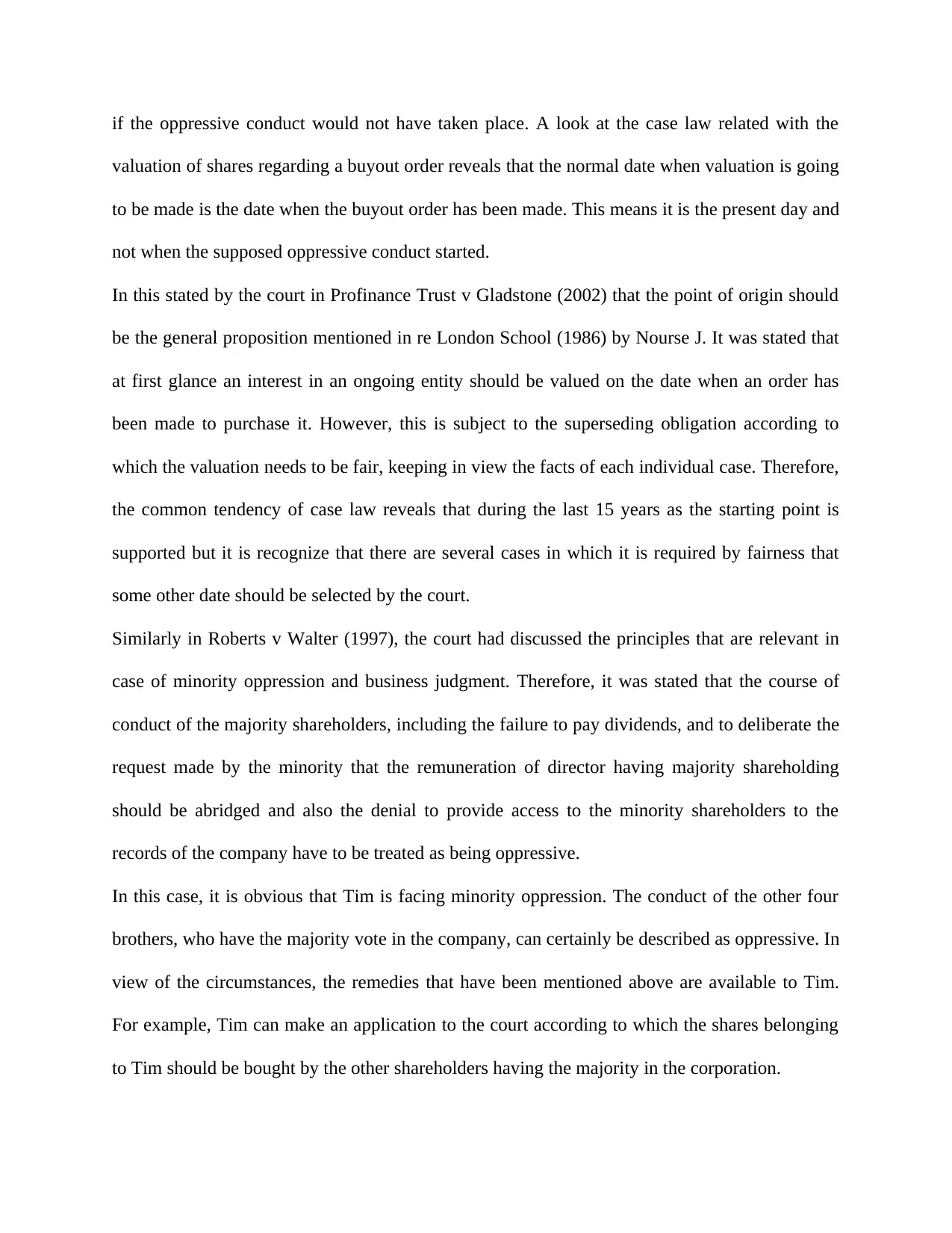
if the oppressive conduct would not have taken place. A look at the case law related with the
valuation of shares regarding a buyout order reveals that the normal date when valuation is going
to be made is the date when the buyout order has been made. This means it is the present day and
not when the supposed oppressive conduct started.
In this stated by the court in Profinance Trust v Gladstone (2002) that the point of origin should
be the general proposition mentioned in re London School (1986) by Nourse J. It was stated that
at first glance an interest in an ongoing entity should be valued on the date when an order has
been made to purchase it. However, this is subject to the superseding obligation according to
which the valuation needs to be fair, keeping in view the facts of each individual case. Therefore,
the common tendency of case law reveals that during the last 15 years as the starting point is
supported but it is recognize that there are several cases in which it is required by fairness that
some other date should be selected by the court.
Similarly in Roberts v Walter (1997), the court had discussed the principles that are relevant in
case of minority oppression and business judgment. Therefore, it was stated that the course of
conduct of the majority shareholders, including the failure to pay dividends, and to deliberate the
request made by the minority that the remuneration of director having majority shareholding
should be abridged and also the denial to provide access to the minority shareholders to the
records of the company have to be treated as being oppressive.
In this case, it is obvious that Tim is facing minority oppression. The conduct of the other four
brothers, who have the majority vote in the company, can certainly be described as oppressive. In
view of the circumstances, the remedies that have been mentioned above are available to Tim.
For example, Tim can make an application to the court according to which the shares belonging
to Tim should be bought by the other shareholders having the majority in the corporation.
valuation of shares regarding a buyout order reveals that the normal date when valuation is going
to be made is the date when the buyout order has been made. This means it is the present day and
not when the supposed oppressive conduct started.
In this stated by the court in Profinance Trust v Gladstone (2002) that the point of origin should
be the general proposition mentioned in re London School (1986) by Nourse J. It was stated that
at first glance an interest in an ongoing entity should be valued on the date when an order has
been made to purchase it. However, this is subject to the superseding obligation according to
which the valuation needs to be fair, keeping in view the facts of each individual case. Therefore,
the common tendency of case law reveals that during the last 15 years as the starting point is
supported but it is recognize that there are several cases in which it is required by fairness that
some other date should be selected by the court.
Similarly in Roberts v Walter (1997), the court had discussed the principles that are relevant in
case of minority oppression and business judgment. Therefore, it was stated that the course of
conduct of the majority shareholders, including the failure to pay dividends, and to deliberate the
request made by the minority that the remuneration of director having majority shareholding
should be abridged and also the denial to provide access to the minority shareholders to the
records of the company have to be treated as being oppressive.
In this case, it is obvious that Tim is facing minority oppression. The conduct of the other four
brothers, who have the majority vote in the company, can certainly be described as oppressive. In
view of the circumstances, the remedies that have been mentioned above are available to Tim.
For example, Tim can make an application to the court according to which the shares belonging
to Tim should be bought by the other shareholders having the majority in the corporation.
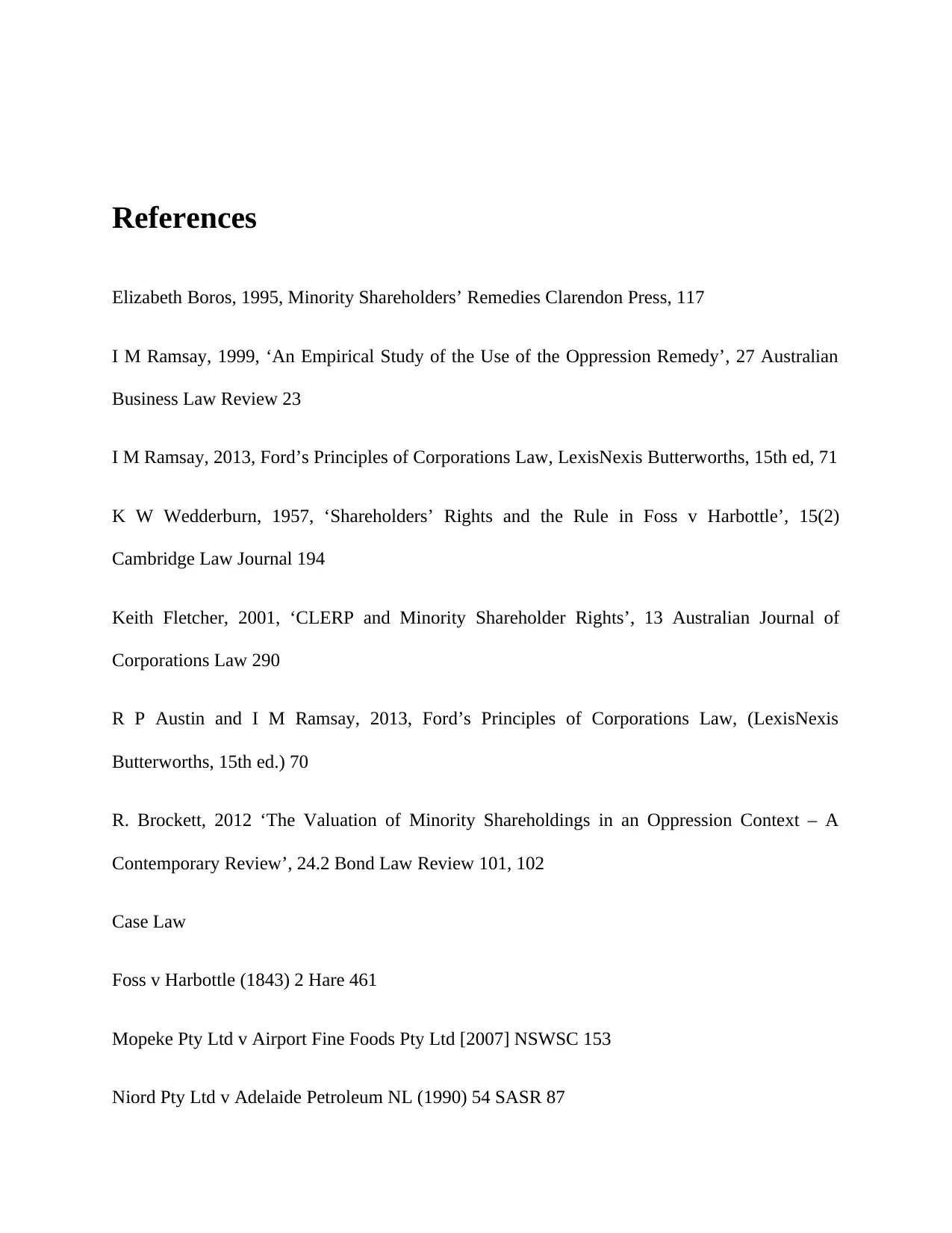
References
Elizabeth Boros, 1995, Minority Shareholders’ Remedies Clarendon Press, 117
I M Ramsay, 1999, ‘An Empirical Study of the Use of the Oppression Remedy’, 27 Australian
Business Law Review 23
I M Ramsay, 2013, Ford’s Principles of Corporations Law, LexisNexis Butterworths, 15th ed, 71
K W Wedderburn, 1957, ‘Shareholders’ Rights and the Rule in Foss v Harbottle’, 15(2)
Cambridge Law Journal 194
Keith Fletcher, 2001, ‘CLERP and Minority Shareholder Rights’, 13 Australian Journal of
Corporations Law 290
R P Austin and I M Ramsay, 2013, Ford’s Principles of Corporations Law, (LexisNexis
Butterworths, 15th ed.) 70
R. Brockett, 2012 ‘The Valuation of Minority Shareholdings in an Oppression Context – A
Contemporary Review’, 24.2 Bond Law Review 101, 102
Case Law
Foss v Harbottle (1843) 2 Hare 461
Mopeke Pty Ltd v Airport Fine Foods Pty Ltd [2007] NSWSC 153
Niord Pty Ltd v Adelaide Petroleum NL (1990) 54 SASR 87
Elizabeth Boros, 1995, Minority Shareholders’ Remedies Clarendon Press, 117
I M Ramsay, 1999, ‘An Empirical Study of the Use of the Oppression Remedy’, 27 Australian
Business Law Review 23
I M Ramsay, 2013, Ford’s Principles of Corporations Law, LexisNexis Butterworths, 15th ed, 71
K W Wedderburn, 1957, ‘Shareholders’ Rights and the Rule in Foss v Harbottle’, 15(2)
Cambridge Law Journal 194
Keith Fletcher, 2001, ‘CLERP and Minority Shareholder Rights’, 13 Australian Journal of
Corporations Law 290
R P Austin and I M Ramsay, 2013, Ford’s Principles of Corporations Law, (LexisNexis
Butterworths, 15th ed.) 70
R. Brockett, 2012 ‘The Valuation of Minority Shareholdings in an Oppression Context – A
Contemporary Review’, 24.2 Bond Law Review 101, 102
Case Law
Foss v Harbottle (1843) 2 Hare 461
Mopeke Pty Ltd v Airport Fine Foods Pty Ltd [2007] NSWSC 153
Niord Pty Ltd v Adelaide Petroleum NL (1990) 54 SASR 87
⊘ This is a preview!⊘
Do you want full access?
Subscribe today to unlock all pages.

Trusted by 1+ million students worldwide

Profinance Trust SA v Gladstone [2002] 1 BCLC 141
re London School of Electronics Ltd [1986] Ch 211.
Roberts v Walter Developments Pty Ltd & Ors (1997) 15 ACLC 882
re London School of Electronics Ltd [1986] Ch 211.
Roberts v Walter Developments Pty Ltd & Ors (1997) 15 ACLC 882
1 out of 10
Related Documents
Your All-in-One AI-Powered Toolkit for Academic Success.
+13062052269
info@desklib.com
Available 24*7 on WhatsApp / Email
![[object Object]](/_next/static/media/star-bottom.7253800d.svg)
Unlock your academic potential
Copyright © 2020–2026 A2Z Services. All Rights Reserved. Developed and managed by ZUCOL.





